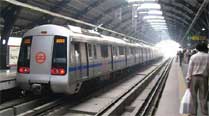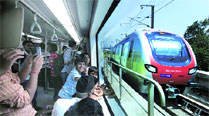 The JV model was first successfully executed in case of the DMRC.
The JV model was first successfully executed in case of the DMRC.
In a marked shift in approach to urban mass transit projects, the Union Government has made it mandatory for state governments seeking central financing for their proposed Metro Rail to involve private players in the execution and running of the system. The Union Cabinet approved the New Metro Rail policy on Wednesday, which states that ‘’Private participation either for complete provisioning of metro rail or for some unbundled components will form an essential requirement for all metro rail project proposals seeking central financial assistance”.
The three broad PPP models detailed in the policy include constructing new Metro Rail systems through the Design-Build-Finance-Operate-Transfer mode, allowing private players to operate the service as well as supply rolling stock, and involving them in the maintenance and upgrading of infrastructure. The new policy, however, was described as “the most disastrous and retrograde urban transport policy’’ by E Sreedharan, who successfully headed the Delhi Metro Rail Corporation (DMRC) since its inception and is currently a principal advisor to it.
Speaking to The Indian Express, Sreedharan, who has consistently advocated against the PPP model in Metro rail, said, “The policy seems to have been framed by someone sitting in the NITI Aayog with absolutely no experience of how metro rail is built and operated. As it is, in India, all 12 such projects put together, only 20-25 km of new metro rail is made operational every year. China is galloping way ahead at 300 km of metro rail being opened every year. We are already moving at a snail’s pace. Now with this policy, everything will come to a standstill.’’
In March, The Indian Express had reported on the proposed move to reduce the Centre’s role in funding metro projects through a push for privatisation. India has, so far, steered clear of PPP in its metro rail projects due to the exigencies of keeping fares of public transport low. Moreover, the capital-intensive nature of such projects do not allow private firms to get a return on their investment unless they hike the fares steeply. Most of the metro rail projects so far have therefore been executed on the joint equity model with the costs being equally shared between the state and central governments.
The JV model was first successfully executed in case of the DMRC, followed by Mumbai Line-3, Nagpur, Bengaluru, Chennai, Ahmedabad, Lucknow, and Kochi. PPP, with Viability Gap Funding from the Union Government, has been tried out only for Mumbai Metro Line-1 and Hyderabad metro rail both of which saw severe cost escalations and delays.
In the case of Mumbai, the private player raised fares steeply. In the Airport line of Delhi Metro, the private concessionaire abandoned the project mid-way forcing the DMRC to step in and take over operations.

